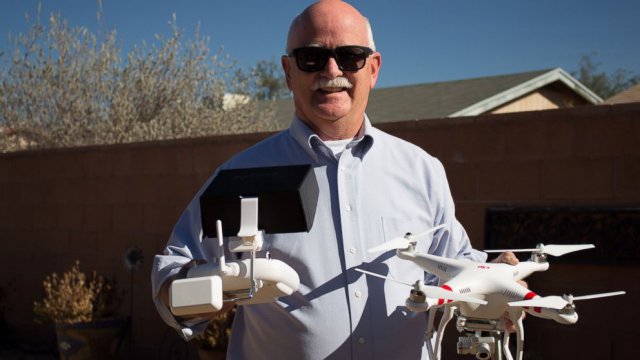 Doug Trudeau, a real estate agent in Tucson, Arizona, just received the FAA’s first unmanned aircraft exemption for real estate so he can take aerial photos and video of homes that are for sale. Trudeau, 61, said he just learned that he won approval to use his $1,500 “Phantom 2 Vision+” quad-copter, which its maker DJI calls a “flying camera.”
Doug Trudeau, a real estate agent in Tucson, Arizona, just received the FAA’s first unmanned aircraft exemption for real estate so he can take aerial photos and video of homes that are for sale. Trudeau, 61, said he just learned that he won approval to use his $1,500 “Phantom 2 Vision+” quad-copter, which its maker DJI calls a “flying camera.”
“Don’t call them drones,” Trudeau told ABC News, preferring to call the devices SUAS or “Small Unmanned Aerial Systems.”
“Drones are a derogatory term. Drones are what you see flying over Afghanistan,” he added. The realtor with 14 years of experience said he doesn’t plan to charge his real estate clients more for capturing aerial imagery.
When asked the question, Trudeau said, “I’m looking out for the little guy…Why shouldn’t I?”
“For $1 million homes, people can spend $5,000 or $10,000 for aerial photography, but for someone with a $200,000 home, they’re not going to spend that much,” he said. “I can do it as part of my service and not charge anything additional.”
Trudeau first applied for an exemption to the FAA’s rules last July with the help of an attorney, only weeks after the FAA included real estate in its interpretation of “commercial use.” In his petition, he notes that he has flown small RC electric helicopters for over six years “without incident.”
The FAA’s 26-page response to Trudeau’s petition stated, “The proposed exemption would allow Trudeau to operate the PHANTOM 2 Vision+ quad-copter unmanned aircraft system (UAS) to conduct aerial videography and cinematography to enhance academic community awareness for those individuals and companies unfamiliar with the geographical layout of the metro Tucson area and augment real estate listing videos.”
But the approval process is not over for Trudeau. He said he’s still reviewing the FAA’s extensive rules, plus he’ll acquire some sort of pilot licensing.
“At first glance it’s going to be pretty extensive, but I’ll start as quickly as I can operate and comply,” he said. And move on he shall before his exemption terminates on Jan. 31, 2017, “unless sooner superseded or rescinded,” the FAA said.
Source: ABC News
[For more information about Section 33 and the exemptions currently granted by the FAA, click here. – Ed.]
